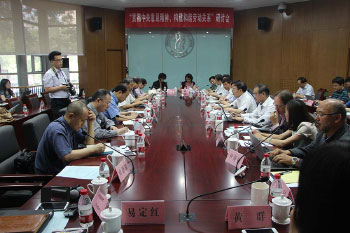Over the weekend, an important conference commenced at Renmin University on subject of "Carrying Out the Spirit of the Central Government's Opinion, Building Harmonious Labor Relations" in China. The meeting sought to clarify opinions released by the top administrative body in China, the State Council, in April. Attended by top academics and officials, including from the official Chinese union federation, Ministry of Human Resources and Social Security, International Labour Organization, and Chinese Enterprise Federation, a number of major viewpoints emerged from the conference, as summarized by a Chinese language news article from Sina:

Labor relations convened at Renmin University.
Credit: Photo China
1. There still remains major divergence on understanding of labor relations. "In the 30 years since Reform and Opening, the country and society has put too much emphasis on capital and management while largely overlooking labor." In short, under the "New Normal", China's workers must share more of the fruits of economic development.
2. There is still a huge amount of work to do on the adjustment of labor relations mechanisms. Rising labor conflict is linked to a wide array of issues. One scholar commented, "Many conflicts are the accumulated consequence of 'the wrong medicine for the ailment'."
3. Collective negotiation and bargaining is the harmonizing mechanism for labor relations under a market economy. While collective negotiation can empower workers to demand higher wages, it also provides the space for employers to demand higher productivity in exchange.
4. Economic growth and wage growth are not necessarily linked. Income produced by China's development has continued to be heavily distributed to capital at the expense of labor. Migrant workers' wage increases have not matched growth in productivity.
5. Current labor conflict has become the primary source of social conflict. "If the government is unable to construct a fair and just policy environment, labor conflict will only intensify, not subside."
6. A balancing of the labor force is required to realize harmonious labor relations. Currently, capital is strong and labor weak. From a social perspective, to empower labor requires the realization of civil rights. Current union building in China involves more than just the workplace; it is linked to entire communities.
7. Building labor relations with Chinese characteristics requires China to walk its own path. China's unique cultural history will mean a different type of labor relations, when compared to "the West".